Top Places to Live 2022: Key to the Kingdom
Low inventory. Feverish demand. Insane prices. And yes, worth every penny. Six ways to unlock the secrets to Boston’s most mysterious real estate market ever.
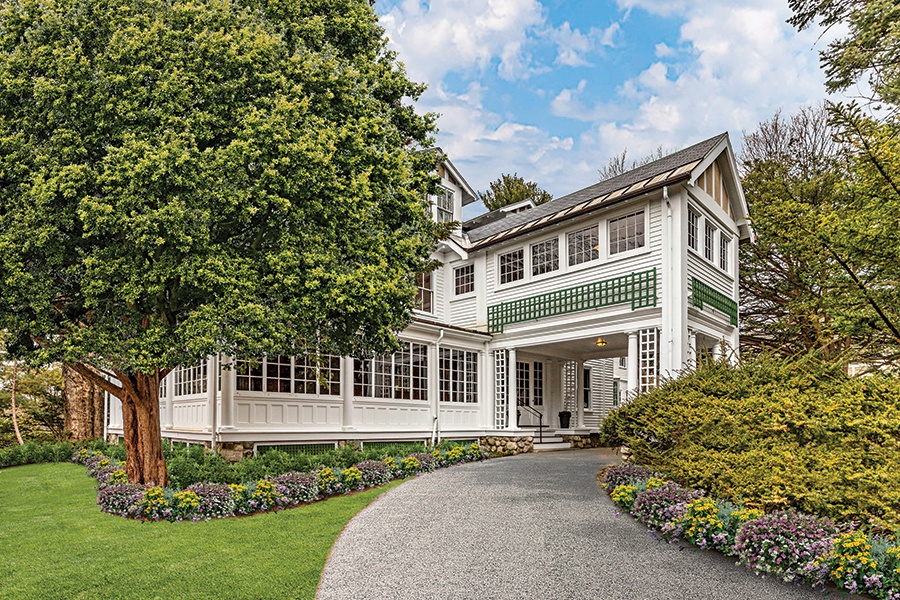
Asking Price $2,950,000 • 5 bedrooms, 4 full bathrooms, 1 half bathroom, 6,170 square feet / Photo courtesy of Elizabeth Crampton, Coldwell Banker Realty/Boston Rep
Route 128 or Bust
When Jeff Gabel and his wife, Anne, agreed to say farewell to their apartment in Bay Village, they decided where to go next by drawing circles on a map of Greater Boston, including one around where Anne worked on Beacon Hill and another around where Jeff worked in Waltham. Then they looked at the overlap of the shapes to see which towns and roadways were close to their respective offices and nearby relatives. Route 128, it turned out, was convenient for both of them.
When the couple began their search in towns that snake along the highway, they found themselves spending more time waiting in line to enter the open houses than touring the homes. More often than not, by the time they did make it inside, they didn’t like what they saw. Inventory was scarce, so most homes didn’t meet their needs or standards. Everyone, it seemed, wanted to ride on down to Route 128. “It has been of interest to city dwellers for many years,” says Dino Confalone, an associate director at Gibson Sotheby’s International Realty and the Greater Boston Association of Realtors’ 2021 president. “But it was definitely accelerated because of the pandemic.”
While some people took the pandemic as an opportunity to bid their daily commute, and thus Greater Boston, adieu (wait until we get to you, new Cape Cod year-rounders), others decided to hedge their bets on the idea that they would one day go into work again on a regular basis. The result? A scramble for homes in towns along major roadways, promising an easy commute should going into the office ever become en vogue again. “There’s a certain level of people thinking about getting back to normal,” Confalone says. “And they know that they’re going to have to go back to work more.” Thanks to buyers’ desire for this commuting safety net, it makes sense Route 128 has become a hot spot. Not only is it replete with junctions to other major highways, but it also benefits from being near commuter rail stops for those buyers who simply can’t deal with city traffic.
This central location was key for the Gabels when they closed on a home in Westwood in December 2020. In addition to falling in love with the house itself (far roomier than their former apartment), their new home allows them to hop onto the highway near Legacy Place and be in Boston in less than an hour. “We like to go out and didn’t want to move too far away from the city,” Jeff says. “We wanted something that was accessible to the city. [In Westwood,] there’s just a nice radius between everything.”
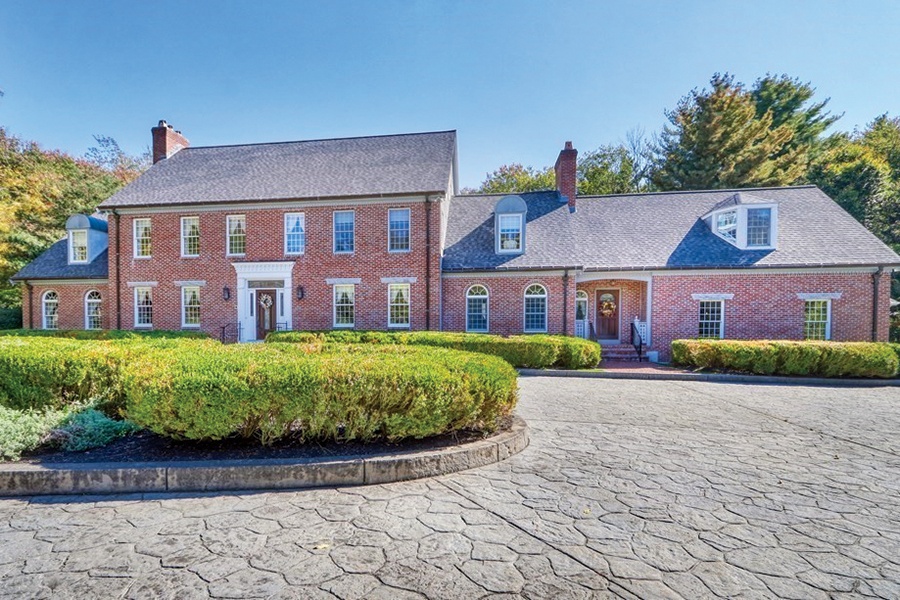
Asking Price $3,400,000 • 5 bedrooms, 4 full bathrooms, 1 half bathroom, 6,499 square feet / Photo courtesy of Coldwell Banker Realty Westwood
Westwood
Median Single-Family Home Price: $1,049,000
Residential Property Tax Rate: $14.83
This suburb boasts excellent schools, a bustling downtown, and perhaps best of all: transit options. Commuters here can choose from driving into work or hopping the commuter rail at the Route 128 train stop that takes people into the city in as little as 20 minutes. What more could you need? Not much, according to the Massachusetts Association of Realtors. The group’s data shows the median single-family home sale price here went from $880,000 in 2020 to $1,049,000 in 2021, exemplifying how eager people are to get at these assets.
Lexington
Median Single-Family Home Price: $1,550,000
Residential Property Tax Rate: $13.80
Boston’s not the only place benefitting from the tech and lab booms. Takeda Pharmaceutical Company, BAE Systems security company, and the MIT Lincoln Lab all call Lexington home, as do some of their employees. Plus, Lexington’s Maria Hastings Elementary School received national recognition as a Blue Ribbon School based on its overall academic excellence, only increasing the appeal for people relocating for a fancy new job at these offices.
Waltham
Median Single-Family Home Price: $705,000
Residential Property Tax Rate: $11.14
Much like Lexington, Waltham is host to a slew of companies, including Raytheon Technologies and Thermo Fisher Scientific, which has created a job boom in this suburb rivaling its urban counterparts. Still, these corporations don’t have to work hard to sway their employees to move here: Waltham’s attractions, such as the Charles Riverwalk and downtown restaurants, bars, and a cinema, pose fierce competition to surrounding communities.
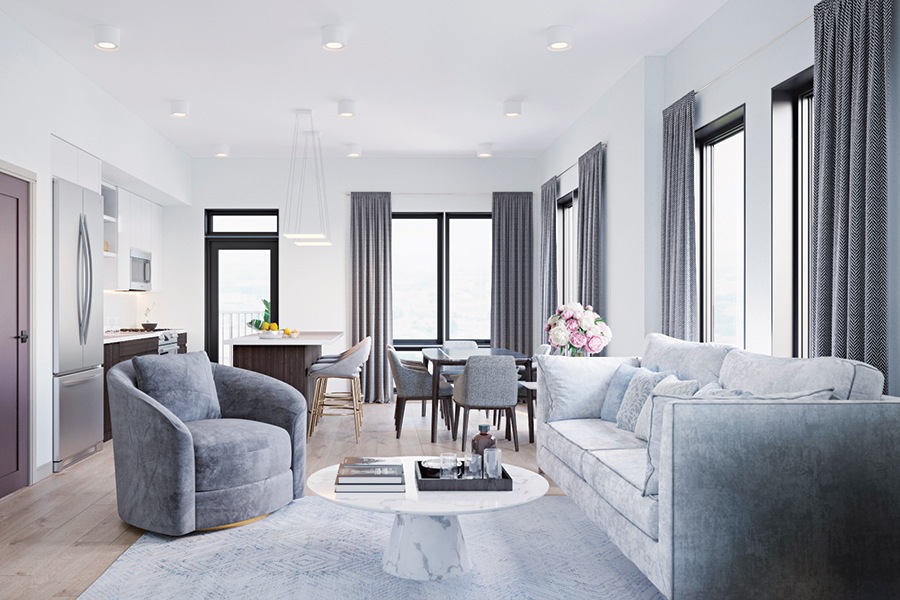
Sold for $940,000 • 2 bedrooms, 2 bathrooms, 1,041 square feet / Photo courtesy of Converge Ventures/Columbus and Over Group
Retail Development
I want it all and I want it now!Yes, this is a line from a famous Queen song, but it also aptly describes the desires of today’s average bedroom community transplant. The “now” part is negotiable, but shoppers definitely want it all, including many of the same things in their new suburban digs that they’d find in their Boston neighborhood. They want the walkability, they want the big downtown, and they especially want a place with open-air shopping. “People want that urban appeal, even in the suburbs,” says Poppy Troupe, a South Shore–based agent with Coldwell Banker. “It’s created a need for those types of stores and retail restaurants. People want to be in the suburbs, but they don’t want to give up the comforts they had.”
Having a top-notch dining scene or a retail and outdoor space that rivals Newbury Street gives communities an edge. When former Cambridge resident Jamie Burke was looking to buy last year, she and her husband landed in Watertown because, despite its lack of transit options (Burke bikes anyway), it has restaurants galore for when the couple wants a night out on the town. “Location-wise, it’s awesome,” she says. “It’s not as convenient [as Cambridge], but because it does have [dining and retail], it was a balance between what we could afford and those amenities.”
Whether it’s living near a big development such as Assembly Row in Somerville, or picking a community like Hingham based on its downtown, the mentality shift is clear and has emerged over the past five years, especially in buyers under age 35, says Zachary Gerg, a Douglas Elliman agent who works with clients in Boston and the surrounding suburbs. While older generations aimed for more of a settled-down lifestyle with marriage and kids, he finds younger homebuyers want a place that reflects the busy, social lifestyle to which they aspire. “Priorities have changed,” he says. “This younger generation is definitely focused on experiencing more aspects of life. It’s not just about that house with the white picket fence anymore.”
As a result, Gerg says more and more developers are beginning to eye the towns surrounding the city for space to create retail and dining spots, knowing that if they build these types of businesses, the shoppers will come. “This live/work/play kind of thing was being pushed out into the suburbs, because people were leaving the city,” he says. “That’s why we have places like Patriot Place and Legacy Place. If people are going to leave the city, we need to provide the same city vibe in these little structures and enclaves in the suburbs.”
Watertown
Median Single-Family Home Price: $785,000
Residential Property Tax Rate: $13.25
If you think Newton real estate is hot, Realtors predict Watertown could reach that level of scorch soon. It’s super close to the city, but also has its own mixed-use developments such as Arsenal Yards, which boasts housing as well as brands including Shake Shack so you can grab a burger on the way home from work (Atkins dieters rejoice!). And there may be more to come: The Watertown Mall was just acquired by new owners who want to add retail and office space to the complex.
Woburn
Median Single-Family Home Price: $630,000
Residential Property Tax Rate: $9.34
Much like its southern counterpart Hanover, Woburn also swapped out its mall for a trendier shopping experience. Its replacement, Woburn Village, features national retailers and restaurants such as Homesense and Cava, with more openings expected in the future. Avalon has a building here offering balcony-equipped apartments that have easy access to the green space, pathways, and roadways all near this up-and-coming complex.
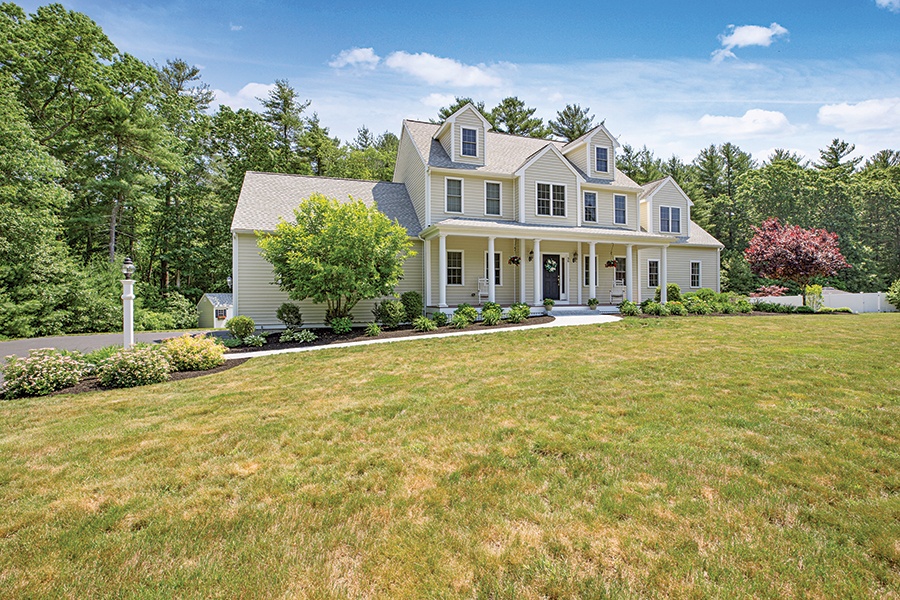
Sold for $1,030,000 • 4 bedrooms, 2 full bathrooms, 1 half bathroom, 3,000 square feet / Photo by Poppy Troupe Coldwell Banker Realty Norwell
Hanover
Median Single-Family Home Price: $677,500
Residential Property Tax Rate: $15.25
Hanover knows what the people want. In 2020, developers tore down the Hanover Mall to replace it with Hanover Crossing, an open-air, mixed-use retail destination that will feature a movie theater, a grocery store, and retail giants such as Dick’s Sporting Goods. Market Basket also plans to open a store there this year. Want in on the action? Consider renting one of the nearly 300 high-end apartments that will also be part of the development.
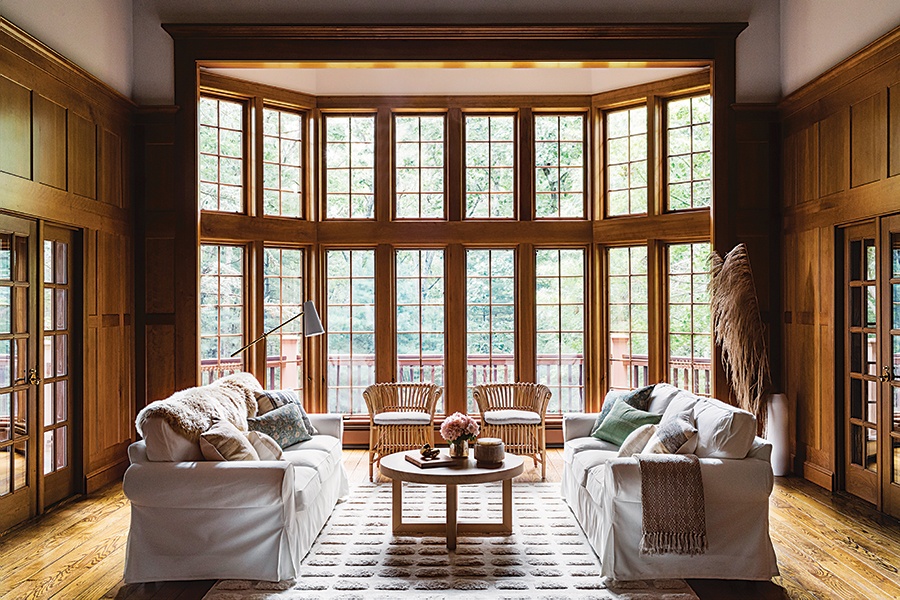
Sold for $2,740,000 • 5 bedrooms, 3 full bathrooms, 1 half bathroom, 7,139 square feet / Photo by Joyelle West/amodio_design/Courtesy of Barrett Sotheby’s International Realty
The High Price-Low Inventory Limbo
If you think this could be the year you’ll find the place of your dreams, you may want to wait until 2023. Buyers are staring down another road of slim pickings when it comes to housing stock. “It will continue to be a market where sellers will be able to get the most for their homes because the inventory is not going to change,” predicts Hilary Larson, a Newburyport-based sales associate with William Raveis. “And because there’s so much demand, it’s keeping prices high.”
Current inventory levels are low enough to spook even the most optimistic of buyers. Former Arlington renter Erin Morrow, for one, entered the house-hunting fray in summer 2021 looking for a condo as far out as Framingham. To her dismay, she discovered that even undesirable places were going for far over asking price. She ended up moving to Providence, where the market is calmer. “I just started feeling like if you don’t have a lot to spend, you’re getting the bottom of the barrel,” she says. “I don’t deserve the bottom of the barrel.”
So other than moving to Providence, what’s a potential buyer to do? Put a pin in house hunting and ride out the year in a rental? That impacts the market, too, Larson says: While delaying home purchases eases demand for housing, it adds stress to the rental market. When people stay in rentals, it increases their scarcity, which leads to rent spikes. As a result, would-be buyers end up spending more on rent and saving less for a down payment for a home. “We see people who want to buy a home but can’t do it,” Zillow economist Nicole Bachaud says. “People will stick in the rental market longer because they can’t make that move.”
These pricey rents also put people who are ready to buy in a pickle. Alaina Lavoie and her wife live in a one-bedroom unit in Quincy, but want to upgrade to a single-family home so they can expand their family. The couple began exploring mortgage options in the fall of 2021, but still haven’t been able to find a home because of a dearth of listings. The ones that are out there either aren’t in their price range or don’t meet their needs. “I really don’t want to rent again,” Lavoie says. “But we are stuck trying to decide whether to renew our lease or force ourselves to buy something.”
The bright side? We may not see the same level of interest from buyers in the coming year that we’ve seen over the past two years, thanks to anticipated interest-rate hikes, Larson predicts. That means prices may cool down and there might be some more housing stock on the market when you do finally decide to brave the buying process.
Concord
Median Single-Family Home Price: $1,475,000
Residential Property Tax Rate: $14.76
Concord’s strong literary community drew many writers there in the 19th century. Today, the town’s pastoral feel, rich cultural history, and great schools easily lure people from other areas. The scramble to get in has been so intense that Realtors say neighboring Acton has seen a boost in sales from people who want to move to Concord but can’t find a house. The demand is so strong that if you do find a home here, expect to shell out over seven figures.
Brookline
Median Single-Family Home Price: $2,026,712
Residential Property Tax Rate: $10.19
Realtors say there’s been a mad dash to Brookline, making it almost impossible to find available inventory here. Like Newton next door, Brookline offers the convenience of the Green Line snaking right through it and, best of all, homes with yards. Whether it be a condo with a courtyard or a single-family home with a front lawn, homebuyers today love the green space offered here as much as they adore the shopping in Coolidge Corner or the fine schools.
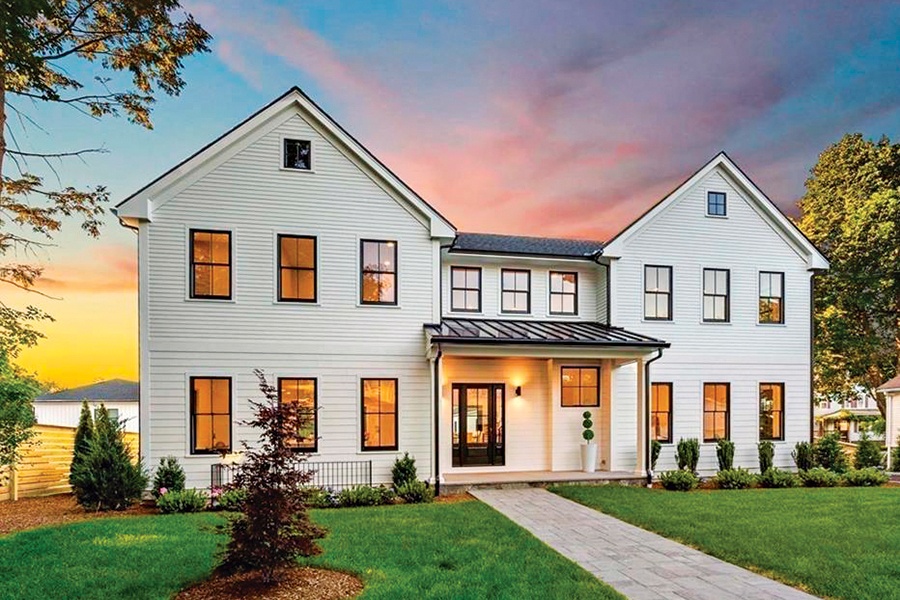
Sold for $3,350,000 • 6 bedrooms, 6 full bathrooms, 2 half bathrooms, 6,945 square feet / Photo courtesy of Unlimited Sotheby’s International Realty
Newton
Median Single-Family Home Price: $1,525,000
Residential Property Tax Rate: $11.14
Newton has long been the go-to for buyers hoping to trade city life for a spot in the ’burbs, and has proven to be an especially popular option for condo seekers. While it’s similar to Brookline in many ways, the tony town is further removed from Boston and less dense, distinguishing itself with larger homes and even grander outdoor spaces.
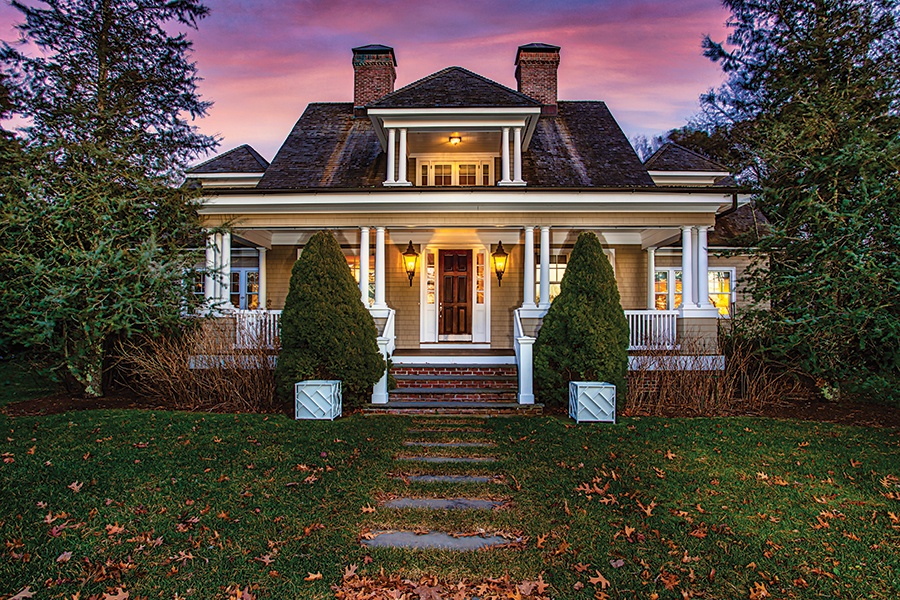
Asking Price: $4,125,000 • 5 bedrooms, 5 full bathrooms, 1 half bathroom, 5,421 square feet / Photo courtesy of Berkshire Hathaway HomeServices Robert Paul Properties JFW Photography
The Great Cape Escape
Ready to trade your office clothes and CharlieCard for flip-flops and long walks on the beach? Join the club. Cape Cod, the place many Bay Staters associate with vacation and retirement, is drawing in a whole new demographic of buyers—and they want to live there even when it’s not swimsuit season.
The Cape’s popularity is nothing new, of course. Michael Leighton, a broker and the owner of Brewster-based Leighton Realty, says he remembers attending a conference 15 years ago where experts predicted more retirees would opt for buying houses on the Cape over splitting time between the Northeast and sunnier climates. But while the Cape’s appeal for empty nesters has always been a given, many professionals—tied to cubicles and career opportunities in the city—shied away from living there full-time.
That is, until recently. Leighton says when COVID struck—and remote work became an option—people moved to their summer homes or bought Cape houses in search of more space. Soon, year-round Cape Codders couldn’t go to the grocery store without hearing recent transplants remarking on how safe they felt in a place that was a little more spread out. “All of a sudden, this is a very attractive place,” Leighton says. “[Newcomers] felt a lot better because they weren’t walking shoulder-to-shoulder down the street with people.”
As for the future? Life moves a little slower here, even when it comes to real estate. While experts foresee a potential cooldown for the rest of the state within the next year or so, they say the beach towns here might be riding the wave of this hot market for a while longer. But purchasing a Cape house is not so simple. “I think the biggest problem with the Cape is inventory, inventory, inventory,” says Myrna Rothman, a Douglas Elliman agent who just sold her own home on the Cape. If you want to cash in on this trend, remember that finding a house here might be like metal-detecting on the beach: You’ll be lucky to uncover something great, but there might not be a lot at your fingertips.
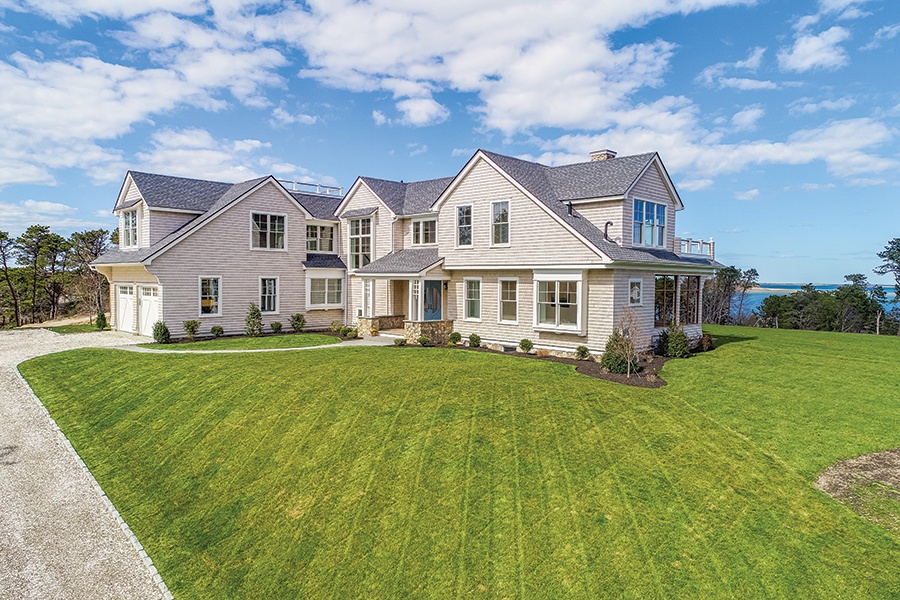
Sold for $3,900,000 • 5 bedrooms, 5 full bathrooms, 1 half bathroom, 4,496 square feet / Photo courtesy of Gibson Sotheby’s International Realty
Chatham
Median Single-Family Home Price: $1,250,000
Residential Property Tax Rate: $4.62
Vintage charm is just part of the lasting appeal of this fishing village turned shopping hub, where the median single-family home price skyrocketed from $863,000 in December 2020 to $1,250,000 in December 2021. Bolstered by its thriving commercial fishing industry, Chatham also impresses with cool boutiques, historical inns, and (of course) plenty of top-notch seafood—always a winning combination.
Barnstable
Median Single-Family Home Price: $570,050
Residential Property Tax Rate: $8.64
While there’s no place that has “something for everyone,” Barnstable comes pretty close. The Cape’s largest town, it includes several villages within its 60 square miles—each with distinct personalities. Like being in the center of everything? Try the Kennedys’ favorite vacation spot, Hyannis. Quiet life on the ocean more your jam? Consider the more residential Cotuit or Osterville. You may never go off Cape again: All your needs can be met right here.
Orleans
Median Single-Family Home Price: $951,000
Residential Property Tax Rate: $7.20
Why buy in Orleans? If living on the elbow of the Cape in what was once named “the happiest seaside town in America” isn’t enough, Orleans also serves as a bit of a connector, joining the outer communities on the Cape with the ones closer to the inner part of the state. Here, you get the best of both worlds, with salty marshlands and access to major roadways.

Sold for $10,200,000 • 6 bedrooms, 7 full bathrooms, 3 half bathrooms, 15,028 square feet / Photo courtesy of Douglas Elliman Real Estate
Turnkey Homes
You’ve done it. After months of house hunting and grueling bidding wars, you’ve finally closed on a home you love. And now, with the headache of moving clearly in the rearview mirror, you want to…renovate? If the words “hard pass” sprang to mind, you’re certainly not alone: Fixer-uppers, once a magnet for anyone with a little money and access to a Pinterest board, now scare away buyers. Turnkey homes, local brokers say, have become much more desirable. “It’s getting to the point where if a home isn’t move-in ready, it doesn’t receive the same level of interest,” says Elena Price, a Westwood-based agent with Coldwell Banker.
Agents attribute this phenomenon to a couple of factors. For one, locals aren’t staying in their houses for decades like they once did; snatching up a recently updated home means buyers won’t have to renovate before they resell their new digs in just a few years. Plus, ongoing supply-chain issues have turned even minor home upgrades into lengthy ordeals, making properties that don’t require any work all the more appealing. Douglas Elliman Realtor Candice Klapman says she’s seen this firsthand, noting her clients’ interest in new (read: maintenance-free) buildings like the Echelon in the Seaport. “It’s easy living,” she says. “People love moving into a brand-new building, and not having to worry about [needing] to find a plumber to get the home up and running.”
The downside? Turnkey homes don’t come cheap. And increasing demand for all that unspoiled newness only makes it more expensive. That’s particularly concerning to first-time homebuyers like Alaina Lavoie and her wife, who have struggled to find move-in-ready homes in their price range. More often than not, houses that fall within their budget need costly repairs. “It would be really huge for us to buy a home to begin with,” Lavoie says. “It was very difficult to save money for a down payment as two millennials with student loan debt. We would pretty much be using all of our savings to buy a home. We just could not afford to replace a roof or something like that.”
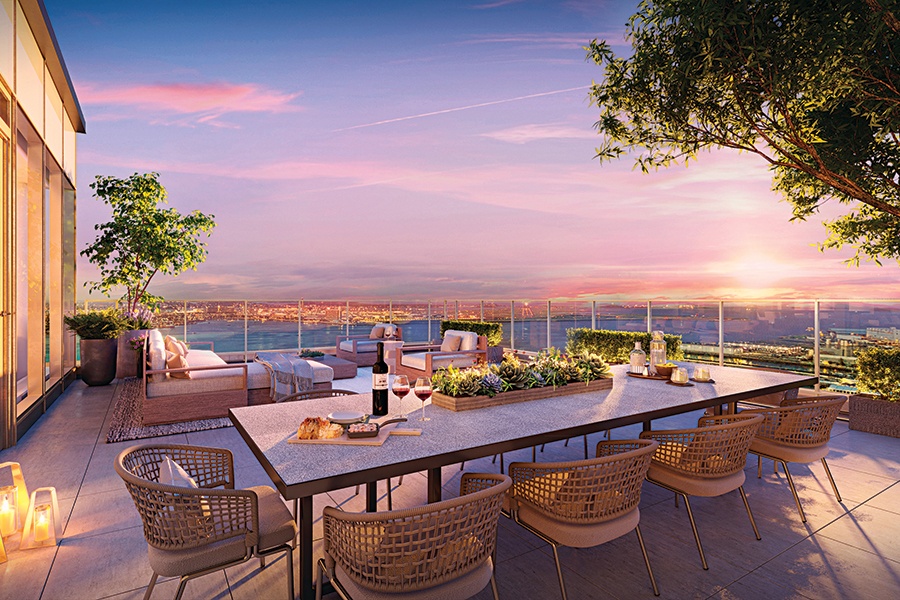
Sold for $4,850,000 • 3 bedrooms, 3 full bathrooms, 1 half bathroom, 1,878 square feet / Photo by Flaunt Boston/Gunnar Glueck/Echelon Seaport
Seaport
Median Condo Price: $1,615,250
Residential Property Tax Rate: $10.88
There’s a reason cranes and construction sites are always popping up all over the Seaport. Arguably the final frontier of Boston real estate today, the former industrial district has attracted everyone from restaurateurs to hoteliers to retailers—all aiming to leave their mark with shiny new builds. Naturally, real estate developers have followed suit, churning out amenity-packed condos in glassy high-rises like 50 Liberty and Pier 4. Translation? There’s always something new to try in this ever-evolving neighborhood.
Weston
Median Single-Family Home Price: $2,105,000
Residential Property Tax Rate: $12.81
Elena Price says buyers seeking a turnkey home should try their luck in Weston, which has a fresher housing stock than neighboring towns. You’ll need to be willing to pay up (the median single-family home sale price went up from $1.6 million to $2.1 million between 2020 and 2021), but the tradeoff is more than worth it: On top of a new house, you’ll have access to excellent public schools, charming shops, and the quiet town’s abundant green space, spread across 2,000 acres. Not too shabby.
Canton
Median Single-Family Home Price: $742,500
Residential Property Tax Rate: $11.35
If you’re combing through Redfin listings, eager to find new construction, you’ll notice Canton comes up again and again. Thanks to the new Canton Reserve development, the town teems with move-in-ready homes. And it’s not just renovations you’ll save time on: With Canton’s proximity to I-95 and Route 128, plus its stop on the commuter rail’s Providence/Stoughton line, getting in and out of Boston is a breeze.
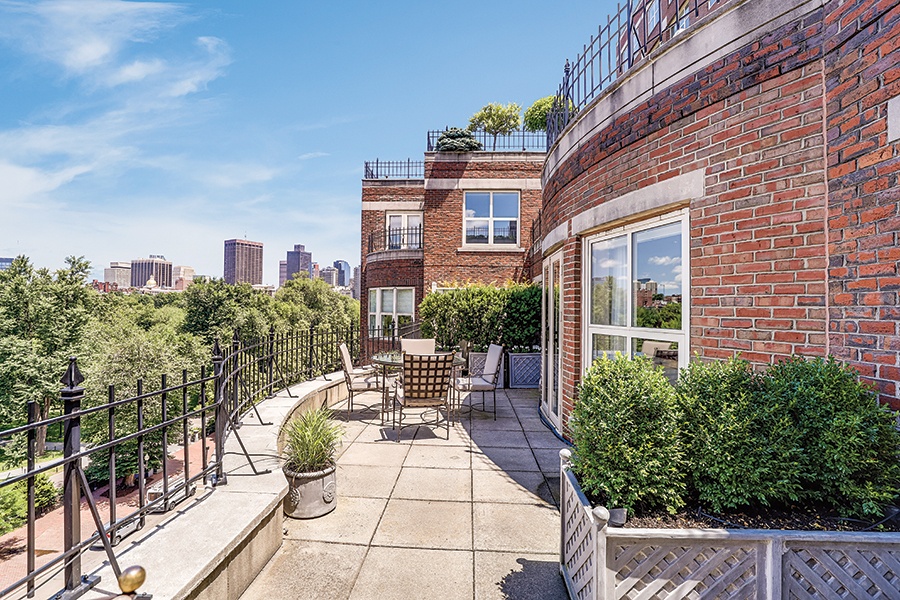
Asking Price $10,550,000 • 4 bedrooms, 4 full bathrooms, 1 half bathroom, 4,810 square feet / Photo courtesy of Douglas Elliman
The Return of the City
Like a fair-weather friend who only wants to hang out after you’ve snagged reservations to the hottest brunch spot, some buyers decided that once bars, restaurants, and local retailers reopened, they did want to live in the city after all. After a positively dismal 2020, when people could not get out of their urban apartments fast enough, real estate activity in Boston and neighboring cities picked up in 2021. Data from the Massachusetts Association of Realtors shows that closings on single-family homes went up 28 percent in Boston between November 2020 and November 2021. During that time, closings on condominiums increased by 44 percent. Simultaneously, in Cambridge, closings on single-family homes soared by 41 percent while closings on condos jumped up 46 percent.
So what gives? While brokers say some people returned to the city after realizing their move to the ’burbs was a mistake, Mary Gillach, a sales associate with William Raveis based out of Brookline, says the release of COVID vaccines and a better understanding of the virus are simply making people feel safe to live near others again. Gone are the days of worrying about catching COVID from a shared front door. “It’s helping people’s confidence in the value of the city,” Gillach says. “There was a time last year where people were wondering if Boston would become a ghost town and if all the action was going to be in the suburbs.”
Still, the desires of would-be city dwellers aren’t completely impervious to COVID-related change. As buyers continue to seek outdoor living areas, historically less desirable neighborhoods such as Dorchester—where coveted green space is easier to find—have seen surges in popularity. House hunters have strong feelings about the interior of their new homes, too: Once satisfied by the bedroom count or the quality of the kitchen and bathrooms, potential purchasers are now more focused on a home’s layout (will they have an office for remote work?) and how close they’ll be to their neighbors in the hallways or entryway. “People are way more sensitive to having open space,” says Cambridge-based Realtor William Senné, president and CEO of the Senné Company. While social distancing may be over, it seems the idea of having your own little bubble, even in the city, is here to stay.
Back Bay
Median Condo Price: $1,299,000
Residential Property Tax Rate: $10.88
You simply can’t keep a good neighborhood down, even during a global pandemic. While the Back Bay saw a downturn in sales in 2020, there’s already a comeback brewing as people clamor for a place that’s not only in a central location but has some of that vintage charm. And if purchases here continue to trend upward, any home you buy will likely only increase in value.
Dorchester
Median Condo Price: $559,000
Residential Property Tax Rate: $10.88
If you want suburban flavor without actually living in the suburbs, don’t count Dorchester out. You’ll have your pick of houses here, many of which boast enviable Victorian details and fit only a few families in contrast to larger buildings downtown. Meanwhile, developments such as South Bay and the proposed Dorchester Bay shopping center add some pizzazz to the area, along with the many mom-and-pop shops that contribute to the neighborhood’s character and small-town feel.
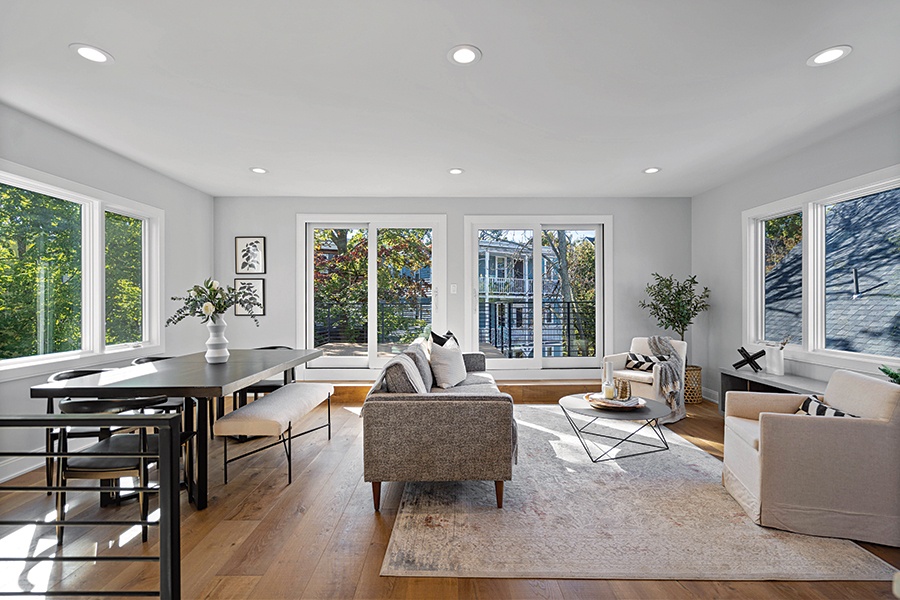
Asking Price $1,549,000 • 3 bedrooms, 2 full bathrooms, 1 half bathroom, 1,605 square feet / Photo courtesy of Mario Massimino of Douglas Elliman
Cambridge
Median Condo Price: $825,000
Residential Property Tax Rate: $5.92
Feeling bold enough to cross the river? If so, you might find Cambridge is worth the journey. Boston’s neighboring (and sometimes rival) city is undergoing a bit of a renaissance with a boom in lab space and tech startups. (Biobot Analytics, the company behind famous COVID tracking method of searching the wastewater? Yeah, that’s Cambridge.) More important, the housing stock includes multi- and single-family homes so you can get some space from all those Harvard students kicking around the block.
Median single-family home and condo prices provided by the Massachusetts Association of Realtors, The Cape Cod & Islands Association of Realtors®, and MLS Property Information Network


